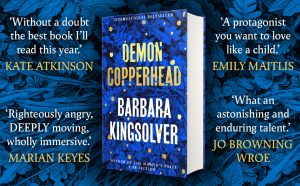It’s a hard hitting story about drug addiction, parentless children who get repeatedly rejected and the horrors of fostering in 1990s/early 2000s Appalachia especially for a mixed race boy. I was riveted, moved and disturbed from page one. I was also completely hooked. It’s a big novel but I read it in four days.
It is based on, and inspired by, David Copperfield but the fascinating thing is that if you knew nothing about Dickens and his famous semi-autobiographical novel you could simply take Demon Copperhead at face value. And it would work brilliantly.
If you are familiar with David Copperfield, however, it’s an odd sensation because you have foreknowledge of the plot. You know who will hook up with whom, who will be ruined and who will die. And you read with a separate level of curiosity as you wonder how Kingsolver will achieve these outcomes while maintaining contextual plausibility.
She does it, very successfully, by not following her source novel too slavishly. If she needs another character she invents one. The Peggot family, for instance live next door to Demon and his mother. They are a couple – kind, loving and decent – with an extended family who all play significant parts in the plot. Dickens simply gave us Peggoty, who eventually marries Barkis, along with her kindly brother at Great Yarmouth. Kingsolver has taken the Peggoty concept and developed it. It’s both ingenious and convincing. And Demon’s own narrative voice is richly arresting.
The novel also reinforces the point that Dickens’s character-types are timelessly true to life. We’ve all met versions of U-Haul the embezzler and Fast Forward the young man with the charisma of a god but who values no one except himself. Then there’s fragile Dori, the first love of Demon’s life, who simply slides ever further into drug addiction and eventually fades away – her faithful dog Jip curled up on her stomach.
Dickens was not, in truth, terribly good at virtuous women. His original Agnes, like Flora Dombey and Rose Maylie, is pallid and not particularly believable. Kingsolver’s Angus is far more interesting. She’s bright, feisty, independent and perceptive. And that makes the ending – in a novel which is ultimately about redemption – arguably better than the Dickens one.
Another glorious thing about Demon Copperhead is the sheer observational exuberance of the writing. Again and again Kingsolver stopped me dead in my tracks with a phrase or description so apt that it chimed. Consider, for instance: “Two dead wasps lay on the sill with their heads close together like a tiny murder-suicide.” Or “The moon was more egg-shaped than round, but seemed proud of itself regardless, laying out a shiny silver road across the water to our feet”. Or “Mr Peg’s people straggled in like a trail of ants carrying their casserole dishes, their sheet cakes, their green Jello rings with wrinkled Saran Wrap skin”. It’s the sort of thing which brings me out in a major attack of writer’s envy.

I always contend that you invariably learn facts from novels. This one packs in a lot of information about the tobacco industry because much of the action is in Virginia so that is another bonus. There’s a fair bit about American football too.
Demon Copperhead was published last year, a Pulitzer prize winner which has also won the Women’s Prize for Fiction. It is now available in paperback although I read it on Kindle. I recommend it very warmly.
Next week on Susan’s Bookshelves: The Franchise Affair by Josephine Tey